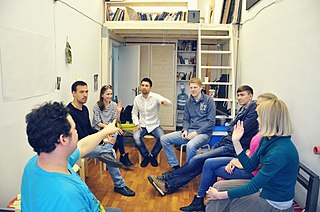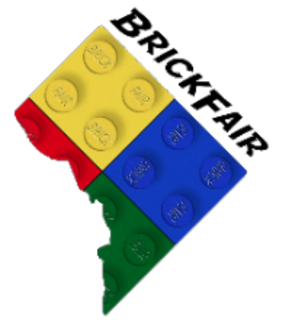
Party games are games that are played at social gatherings to facilitate interaction and provide entertainment and recreation. Categories include (explicit) icebreaker, parlour (indoor), picnic (outdoor), and large group games. Other types include pairing off (partnered) games, and parlour races. Different games will generate different atmospheres so the party game may merely be intended as an icebreakers, or the sole purpose for or structure of the party. As such, party games aim to include players of various skill levels and player-elimination is rare. Party games are intended to be played socially, and are designed to be easy for new players to learn.

Beer pong, also known as Beirut, is a drinking game in which players throw a ping pong ball across a table with the intent of landing the ball in a cup of beer on the other end. The game typically consists of opposing teams of two or more players per side with 6 or 10 cups set up in a triangle formation on each side. Each team then takes turns attempting to throw ping pong balls into the opponent's cups. If a ball lands in a cup, the contents of that cup are consumed by the other team and the cup is removed from the table. The first team to eliminate all of the opponent's cups is the winner.
Chinese whispers or telephone is an internationally popular children's game. It is also called transmission chain experiments in the context of cultural evolution research, and is primarily used to identify the type of information that is more easily passed on from one person to another.
A LAN party is a gathering of people with computers or compatible game consoles, where a local area network (LAN) connection is established between the devices using a router or switch, primarily for the purpose of playing multiplayer video games together. The size of these networks may vary from as few as two people to very large gatherings of a hundred or more. Small parties can form spontaneously and take advantage of common household networking equipment, but larger ones typically require more planning, equipment, and preparation.

Cheat is a card game where the players aim to get rid of all of their cards. It is a game of deception, with cards being played face-down and players being permitted to lie about the cards they have played. A challenge is usually made by players calling out the name of the game, and the loser of a challenge has to pick up every card played so far. Cheat is classed as a party game. As with many card games, cheat has an oral tradition and so people are taught the game under different names.

Strip games or stripping games are games which have clothing removal as a gameplay element or mechanic. The clothing may be removed to keep score, or as penalty for a loss. Some games are sexualised and the eventual complete loss of clothing is considered part of a usual game in the style of a striptease, whereas others merely presume the loss of clothing as an inconvenience. While games involving stripping have been invented independently of non-stripping games, it is also the case that games not normally involving clothing loss can be adapted into strip games. In such instances, some rulesets are more amenable to adaptation than others.
Concentration is an American television game show based on the children's memory game of the same name. Matching cards represented prizes that contestants could win. As matching pairs of cards were gradually removed from the board, it would slowly reveal elements of a rebus puzzle that contestants had to solve to win a match.
In rare cases, baseball games are forfeited, usually when a team is no longer able to play. In the event of forfeiture, the score is recorded as 9–0, as stated in rule 2.00 of the Official Baseball Rules issued by Major League Baseball. The 9–0 score equates to one run per each regulation game inning not played. Actual game statistics are recorded as they stand at the time of the forfeit; the game is recorded as a loss in the standings for the forfeiting team and a win for the other team, even if the forfeiting team is ahead at that point.
Truth or dare? is a mostly verbal party game requiring two or more players. Players are given the choice between answering a question truthfully, or performing a "double dare", both of which are played by both players. The game is particularly popular among adolescents and children, and is sometimes used as a forfeit when gambling.

Magic: The Gathering Online is a video game adaptation of Magic: The Gathering, utilizing the concept of a virtual economy to preserve the collectible aspect of the card game. It is played through an Internet service operated by Wizards of the Coast, which went live on June 24, 2002. The game does not run on mobile as Magic: the Gathering Arena does, since it is only install-able on Microsoft Windows. Users can play the game or trade cards with other users.

A traveling carnival, usually simply called a carnival, or travelling funfair, is an amusement show that may be made up of amusement rides, food vendors, merchandise vendors, games of chance and skill, thrill acts, and animal acts. A traveling carnival is not set up at a permanent location, like an amusement park or funfair, but is moved from place to place. Its roots are similar to the 19th century circus with both being fitted-up in open fields near or in town and moving to a new location after a period of time. In fact, many carnivals have circuses while others have a clown aesthetic in their decor. Unlike traditional carnival celebrations, the North American traveling carnival is not tied to a religious observance.
Hot potato is a party game that involves players gathering in a circle and tossing a small object such as a beanbag or even a real potato to each other while music plays. The player who is holding the object when the music stops is eliminated.
Algorithmic game theory (AGT) is an area in the intersection of game theory and computer science, with the objective of understanding and design of algorithms in strategic environments.

A chess tournament is a series of chess games played competitively to determine a winning individual or team. Since the first international chess tournament in London, 1851, chess tournaments have become the standard form of chess competition among serious players.
The Dominant Factor Test is the principle that most U.S. jurisdictions use in determining, legally, what is and is not gambling. The California Supreme Court said:

Sport pertains to any form of competitive physical activity or game that aims to use, maintain, or improve physical ability and skills while providing enjoyment to participants and, in some cases, entertainment to spectators. Sports can, through casual or organized participation, improve one's physical health. Hundreds of sports exist, from those between single contestants, through to those with hundreds of simultaneous participants, either in teams or competing as individuals. In certain sports such as racing, many contestants may compete, simultaneously or consecutively, with one winner; in others, the contest is between two sides, each attempting to exceed the other. Some sports allow a "tie" or "draw", in which there is no single winner; others provide tie-breaking methods to ensure one winner and one loser. A number of contests may be arranged in a tournament producing a champion. Many sports leagues make an annual champion by arranging games in a regular sports season, followed in some cases by playoffs.

BrickFair is a Lego convention and exhibition held annually in the Eastern United States. It was first held in 2008 at Tysons Corner, Virginia by Todd Webb, and in subsequent years, the Virginia convention has been held in Chantilly, typically during the first weekend of August. BrickFair is a four-day event, operating generally Thursday through Sunday. The convention displays Lego models, displays and trains, most often covering more than 100,000 square feet of convention space. BrickFair conventions are also held in New England and the Southeastern United States, with the advent of BrickFair Alabama in 2012 and BrickFair New England in 2013. BrickFair operates in every season and in four East Coast states. BrickFair is believed to be the largest Lego convention in the United States and one of the largest in the world. The Virginia convention has had up to 22,500 attendees in its public hours.
Monopoly Millionaires' Club is an American game show that debuted in syndication on March 28, 2015. Hosted by stand-up comedian/actor Billy Gardell, best known for his role as Chicago police officer Mike Biggs on the sitcom Mike & Molly, it was initially based on an unsuccessful drawing game of the same name that was coordinated by the Multi-State Lottery Association (MUSL), using the Monopoly board game brand under license from Hasbro. The lottery game returned, in scratch-off form, in the spring of 2015.
The Ottawa Sharpshooters were a junior ice hockey team from Almonte, Ontario, Canada. They began play in the 2016–17 season in the Canadian Premier Junior Hockey League (CPJHL). After two seasons in the CPJHL, the Sharpshooters joined the Greater Metro Junior A Hockey League (GMHL) for 2018–19. In December 2019, the Sharpshooters folded during their second season in the GMHL.

HQ is a trivia mobile game developed by Intermedia Labs for iOS, Android, iPadOS, and tvOS. First released in 2017, the HQ app allows users to play in daily live trivia games, through which they can win or split prize money. HQ was developed by Vine creators Rus Yusupov and Colin Kroll, and credited as a production of Intermedia Labs. The app's original game was HQ Trivia, in which players have 10 seconds to answer multiple-choice questions that incrementally increase in difficulty. Additional games, such as HQ Words and HQ Tunes, were added later.










